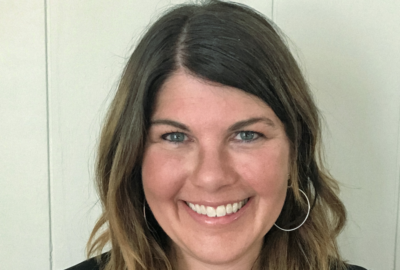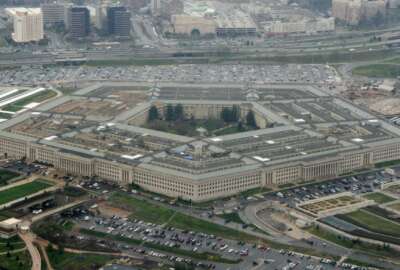
NARA pitching in extra PPE to coronavirus effort
People in the National Archives and Records Administration's records center in St. Louis recently delivered supplies to the VA medical center in the city.
Best listening experience is on Chrome, Firefox or Safari. Subscribe to Federal Drive’s daily audio interviews on Apple Podcasts or PodcastOne.
Mark this next story under the category of, every little bit counts. People in the National Archives and Records Administration’s records center in St. Louis recently delivered supplies to the Veterans Affairs Department medical center in the same city. You might not think of NARA as a source of N-95 face masks. But it was. For the rest of the story, Federal Drive with Tom Temin spoke to NARA conservator Vicki Lee.
Interview transcript:
Tom Temin: Good to have you on.
Vicki Lee: It’s nice to be on with you.
Tom Temin: And it sounds like several units of NARA had the same idea kind of simultaneously that you use the same types of equipment in conservation work that medical workers use in medical work.
Vicki Lee: Yes, ours don’t tend to be sterilized like theirs are but it is the same gloves and masks and PPE generally,
Tom Temin: And how do these come into conservation in the first place?
Vicki Lee: Well, we buy them because we do work with some chemicals and so we try to protect ourselves from that, and then we also do a lot of mold remediation where we’ll need to wear a mask and gloves while we’re working with that. Also, we do respond to some disasters and we bring our own equipment with us when we do that, because you don’t want to tax the system that’s already going under the stress of a disaster.
Tom Temin: Plus you handle delicate old documents to write and film and so on.
Vicki Lee: Yes, for the film and photographs, we would use gloves, but when we’re handling books and documents, we just keep our hands washed, so we didn’t have a hard time with the new washed your hands for 20 seconds. We’ve washed our hands countless times over the course of a day.
Tom Temin: Wow. Must be instead of having purell, I would want hand cream around washing.
Vicki Lee: You can use hand cream at lunchtime, but you can’t use hand cream when you’re actually handling the documents.
Tom Temin: Would not be good on film and books and so forth. Anyhow, you have donated facemasks, your St. Louis branch went to Veterans Affairs medical center there, you’re in College Park, tell us what you donated and to whom.
Vicki Lee: We donated masks and gloves and tyvek suits, and also some tyvek lab coats, and a few safety goggles that we had that hadn’t been opened in use before. And they all went to the DC emergency management for distribution to hospitals in the DC area.
Tom Temin: Got it. And did you leave yourself enough to be able to still work at NARA?
Vicki Lee: Yes, yeah. When we get back in the buildings we did. We gave them about half of everything that we had, actually, they got all of our tyvek overalls, and things like that, but we gave them about half of our gloves and about half of the masks that we have.
Tom Temin: Sure. Well, before we get to your role as kind of disaster responders, which I think this is the first I’ve heard of it. I wanted to ask you what it is like to try to do conservation when everyone has teleworking or is that all just you put everything on hold for the duration.
Vicki Lee: We have to put everything on hold as far as the physical conservation because of course we can’t bring things out of the archives and into our homes and apartments. So all of the physical nature of the work. But I’ve been writing some standard operating procedures, and I had a couple of treatments that I had completed. So I’m writing those final reports that we send out to, in this case, it was the Eisenhower Library, I was working on something for them. So there’s work that we can do. And then also, the archive itself has a lot of the research services units have projects that of course, you know, they never have enough people to work on them. So we’re all pitching in and working on some of those like cataloguing projects and things like that.
Tom Temin: And I guess you probably can’t answer this from your perspective, but a lot of the federal records that come in electronically, I guess those can still be processed remotely because it is online. That’s a different part of NARA though, isn’t it?
Vicki Lee: Yes, I would assume so. But I don’t know for sure.
Tom Temin: And you have some background in disaster response, and this is in the context of NARA?
Vicki Lee: Part of it is. I have been a disaster responder with the American Institute of Conservation, which is the professional organization for different kinds of conservators painting and paper and objects. I’ve been doing that since 2008. We have a training program and then I’ve responded to probably 10 disasters, several major ones. I’ve responded to the earthquakes in Haiti, and Hurricane Sandy and I did that through the American Institute of Conservation, and now that I’ve joined NARA, in 2016, I’ve been doing work through FEMA and the Department of Interior when Hurricane Maria struck Puerto Rico, FEMA received a request from the archives of Puerto Rico for assistance. And so they requested subject matter experts. And so of course, there were four of us, eventually, who went, we made several trips, I’ve probably been either three or four times now down to assist in Puerto Rico. And those trips have been with sort of like under FEMA, but it’s as a national archives person that I go.
Tom Temin: I guess this has a long history. Didn’t Dolly Madison is said to have run out of the burning White House in the war of 1812 with the portrait of George Washington, so NARAs purpose in there is to secure valuables that exists as records, correct?
Vicki Lee: Yes, we will help carry things out if that’s what you need. But mostly we go to give advice and to just help in any way to do trainings. We did probably six trainings when we were down in Puerto Rico. We went to the central archives, and we did two trainings there the first trip and the second trip, we went, we actually went to three different locations around the islands so that everything wasn’t centralized in San Juan because people were still having a hard time getting around. And so we went to Mayagüez and Ponce. And actually, we did come back and do another one in San Juan. And they were open to any Museum, archive and library personnel who wanted to come and we did training on how to handle damaged materials,
Tom Temin: What types of materials tend to be most valuable or subject to damage that you’ve come across in a place like Puerto Rico?
Vicki Lee: Well, in Puerto Rico, it was interesting because most of the damage occurred because of the lack of electricity over long periods of time. Many archives and libraries and museums are sort of hermetically sealed buildings. They don’t have windows that you know, you can throw open when it gets too warm inside because they’re trying to keep pollutants out and things like that and trying to keep the temperature and humidity stable. But when you lose all your electricity And you’re HVAC isn’t working for six months or eight months, then the humidity builds up in your building and you can have mold outbreak. So that was mostly what we saw.
Tom Temin: And this was the official records? Like vital records or government records.
Vicki Lee: Mm-hmm.
Tom Temin: So that would, that’s a good argument for going electronic on a lot of all this, isn’t it?
Vicki Lee: Well, if you don’t have electricity, you can’t see those records.
Tom Temin: Well, that’s true, but at least they won’t get ruined by humidity.
Vicki Lee: Well, your computer will rust if it gets wet enough.
Tom Temin: True enough, I guess yeah. So well, as a long time conservator and having seen what can happen, do you still believe in the value and efficacy of non electronic, that is to say, paper and other media based records?
Vicki Lee: Oh, yes, I’m, I’m very much a Luddite. I mean, I have my cell phone and I’m sitting here talking to computers. But yes, paper will always be the way to go as far as I’m concerned. Because you don’t you know, if it’s sunny outside, I can take a piece of paper and move to the window and read it even if I don’t have electricity. But if all my records are just in a computer, I can’t do anything with that. if there’s no electricity.
Tom Temin: I’ll tell you my dirty little secret. I still have three manual typewriters in the basement.
Vicki Lee: That’s wonderful. Yeah, you should.
Tom Temin: Alright. Vicki Lee is a conservator of the National Archives and Records Administration. Thanks so much for joining me.
Vicki Lee: You’re welcome. Thank you for having me.
Copyright © 2025 Federal News Network. All rights reserved. This website is not intended for users located within the European Economic Area.
Tom Temin is host of the Federal Drive and has been providing insight on federal technology and management issues for more than 30 years.
Follow @tteminWFED
Related Stories

Thinking of joining the fight? Here are 5 interesting coronavirus response jobs




